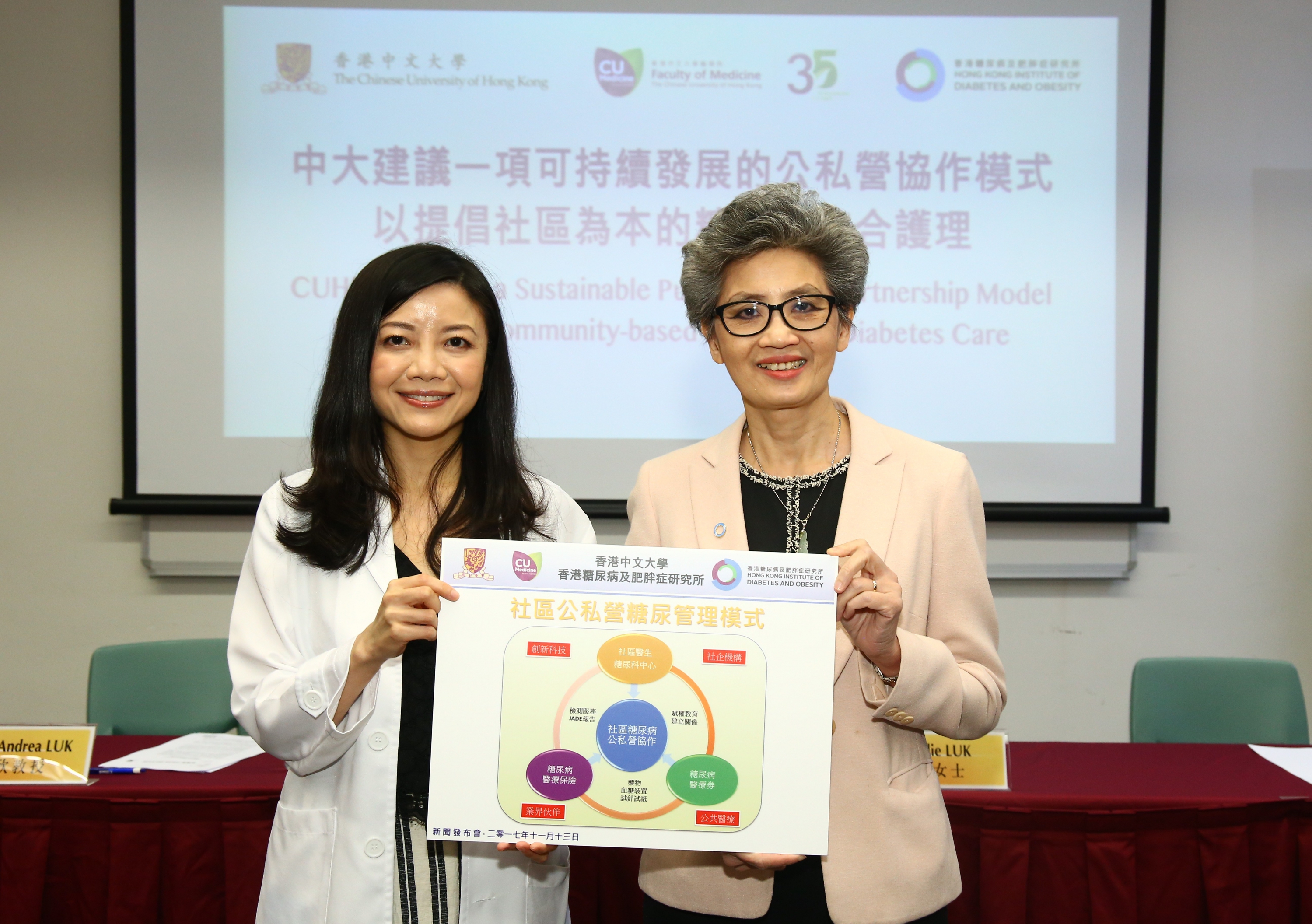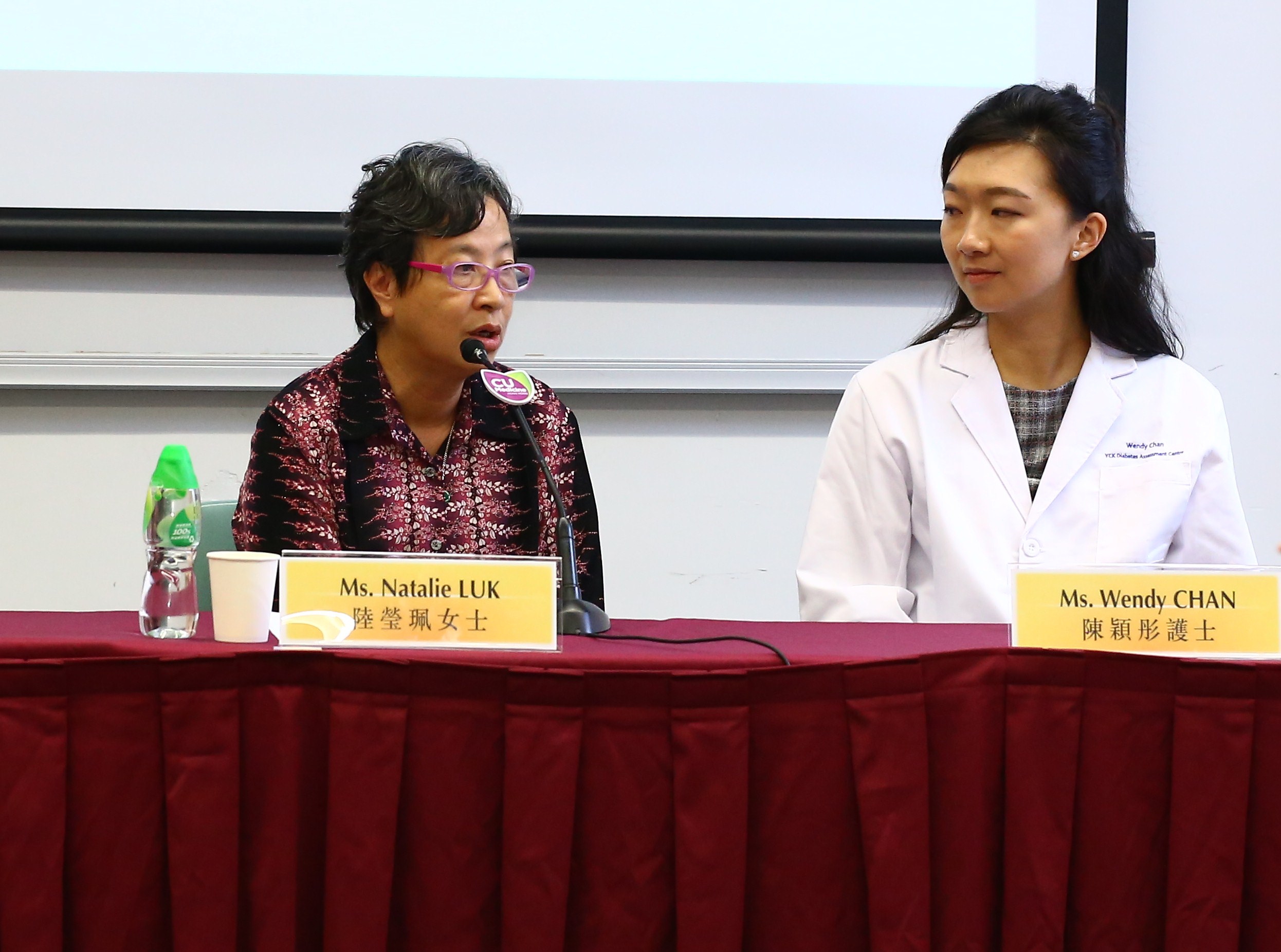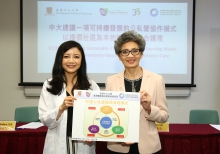CUHK
News Centre
CUHK Proposes the Implementation of a Sustainable Public-Private-Partnership Model to Promote Community-based Integrated Diabetes Care
Research shows that diabetes patients cared for in a public-private-partnership are at 50% less risk than in standard public health care. A research team led by Prof. Juliana Chan, Director of Hong Kong Institute of Diabetes and Obesity at The Chinese University of Hong Kong (CUHK) has recently analysed the outcomes of 16,670 patients with diabetes in three care settings to evaluate the impact of a public-private-partnership model to improve diabetes care in the community. Research findings show that patients who were followed up on by their respective community doctors with yearly assessment and a personalized report using the web-based Joint Asia Diabetes Evaluation (JADE) technology at the CUHK Yao Chung Kit Diabetes Assessment Centre, had 50% lower risk of hospitalization, critical illness and death rates than under standard care in the public setting. This research is funded by the HKSAR Government Central Policy Unit’s Public Policy Research Funding Scheme.
Economic implications on implementing the public-private-partnership community-based diabetes care model (PPP diabetes care model)
The research team compared the outcomes of 3,570 patients receiving standard care in the public setting, with that of 9,676 patients managed in the public setting enhanced by the JADE personalized report. Also compared were the outcomes of 3,424 patients followed up by their respective community doctors with yearly assessment and JADE personalized report provided by the CUHK Yao Chung Kit Diabetes Assessment Centre (PPP diabetes care model). This was covering the period from November 2007 to May 2015. Of these 16,670 patients, 12%, 66% and 22% respectively belonged to the high, medium and low risk groups with 7.7 days, 3.5 days and 1.6 days of hospitalization per person on a yearly basis.
One in 10 people in Hong Kong have diabetes with an estimated 400,000 patients now followed up in the public care setting. Of this population, 2% – 6% of people may die or develop heart disease, stroke or kidney failure every year. The 2015 annual budget was HKD55.2 billion for public health care. The implementation of the PPP diabetes model in the community will not only help these people lower 50% hospitalization rates, but also help the government save an estimated expenditure of HKD3.2 billion, representing about 6% of the annual public health care budget.
Dr. Andrea Luk, one of the key researchers said, ‘A trusting doctor-patient relationship is crucial in the management of diabetes where patients need time, explanation and feedback to learn about the disease, take medications regularly and acquire new habits. Our diabetes nurses at Yao Chung Kit Diabetes Assessment Centre help busy doctors manage their patients effectively by providing ongoing comprehensive assessment, along with the personalized JADE report and education support, to engage and empower patients through various activities.’ Implementation of the PPP diabetes care model in the community will help establish a stable doctor-patient relationship to go with the assessment and education provided by the nurse-led diabetes centres, while at the same time reduce complications.
Long-term impacts on the PPP diabetes care model
The team also simulated the clinical outcomes in 400,000 patients with diabetes profiles similar to those receiving public care, using the Chinese Diabetes Outcome Model (CDOM), a model developed by the CUHK diabetes research team to quantify interactions among demographic profiles, risk factors and complications, in order to predict the probabilities of multiple critical illnesses till occurrence of death over a 15-year period. Projected figures show that the implementation of a sustainable PPP diabetes care model helps promote community-based integrated diabetes care by reducing cardiovascular-renal disease and death by 11% – 77%, through the prevention of 6,536 heart attacks, 12,692 strokes, 34,405 dialysis cases and 47,796 deaths.
Prof. Juliana Chan, principal investigator of the research project added, ‘The Hong Kong Government encourages public-private-partnership and community-based care to promote health and manage chronic diseases. Our analysis indicated that the PPP diabetes care model will not only reduce hospitalization but also save life and resources. Affordable and user-friendly services in the community will provide timely and alternative choices for diabetes management, while the public setting can focus on the sick, complex and needy patients. By encouraging the right patients to be seen at the right time by the right team, our health care will become more accessible and sustainable.’
The web-based JADE technology is a CUHK knowledge transfer project consisting of risk algorithms and care protocols with decision support, based on the Hong Kong Diabetes Register established in 1995.
The CUHK Yao Chung Kit Diabetes Assessment Centre was established through donation in 2007 and is the first university-affiliated diabetes centre in Hong Kong, providing, since its inception, affordable evidence-based comprehensive diabetes assessment services to over 19,000 people with or at risk of having diabetes in the community.
The full report is published at
https://www.pico.gov.hk/doc/en/research_report(PDF)/2015_A4_008_15C_Final_Report_Prof_Chan.pdf
A study conducted by Dr. Andrea Luk (left) and Professor Juliana Chan reveals that diabetes patients cared for in a public-private-partnership are at 50% less risk than in standard public health care.
Ms. Natalie Luk (left) was diagnosed with diabetes in 2005 and has been referred by her community doctor with yearly assessment and JADE personalized report provided by the CUHK Yao Chung Kit Diabetes Assessment Centre since 2012. Her A1c remains stable at good level without complications over the years.







